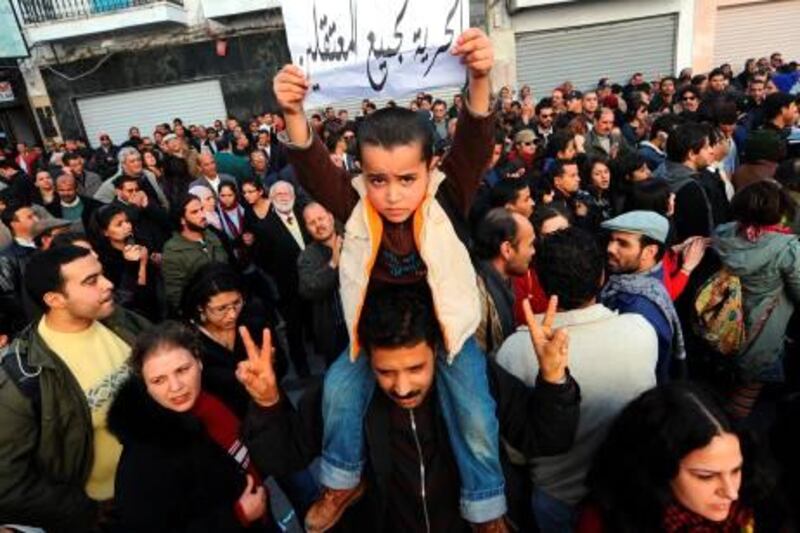TUNIS // It was a Friday afternoon in the Tunisian capital, and phones at the headquarters of the opposition Democratic Progressive Party (PDP) were buzzing with news of police and protesters clashing in the country's heartland.
"Today, the police used live ammunition," said a leading party member, Najib Chebbi, speaking last Friday.
Such reports have filtered out of rural towns since last month, as Tunisian authorities struggle to contain a wave of angry protests over unemployment and the cost of living that has gripped the country.
Yesterday, Tunisia's state news agency said that eight people had been killed in confrontations between the police and protesters in the previous 24 hours.
Meanwhile in Algeria, rising food prices triggered nationwide riots last Wednesday.
Four people have since died in the unrest, with calm appearing to return yesterday after the government announced measures to lower the cost of staples including sugar and cooking oil.
Algeria boasts vast oil wealth, while Tunisia has liberalised markets and enjoys living standards often on par with Western Europe. However, both have failed to curb high unemployment that is most severe among young people.
Complicating things are political systems that "are both authoritarian, so there's no way for expressions of protest to be channelled in a productive way", said Yahia Zoubir, a professor of international relations at Euromed Management, a private business school in Marseille, France.
Discontent has spiralled in Algeria, Mr Zoubir said, with sporadic riots around the country in recent years. "Whether the issue is water shortage or electricity problems, there's always been something."
Tunisia, however, has been caught off guard. Public protests are a rare occurrence in the country, tightly controlled since 1987 by the president, Zine el Abidine Ben Ali.
Trouble began three weeks ago, when police in the central town of Sidi Bouzid confiscated produce sold by a university graduate, Mohamed Bouazizi, 26, on the grounds that he was unlicensed.
In protest, Mr Bouazizi doused himself in petrol and, before a horrified public, set himself alight. He died last Tuesday in hospital from his burns.
The act triggered demonstrations in Sidi Bouzid that have rippled across the Tunisian landscape.
Mr Ben Ali last month sacked three ministers and Sidi Bouzid's governor, and has pledged to spend 6.5 billion Tunisian dinars (Dh16.2bn) on creating jobs for university graduates.
Such moves were not enough to solve Tunisia's unemployment woes, said Mr Chebbi. The PDP is calling instead for economic and political reform.
"The government's failures have been laid bare: its development model, its management of regional affairs and a representative system that have never reflected the people," Mr Chebbi said.
Mr Ben Ali has condemned the protests and warned that they risk frightening off the foreign investment and tourists that are key to Tunisia's economy, while police have mobilised to quell them.
"Instead of seeking dialogue with the demonstrators, the authorities are choosing to use force," said Attia Athmouni, a senior member of the PDP and spokesman for the Sidi Bouzid Support Committee, which represents activists from the town.
Some protesters have set fire to cars and public buildings, while police have sometimes opened fire, according to wire service reports and Tunisia's state news agency.
Tunisian authorities have said that police have used force only in self-defence, or to protect lives and prevent protesters from attacking state buildings.
The Paris-based media rights watchdog Reporters Without Borders accused Tunisian authorities in a statement last Friday of seeking to smother coverage of the protests by arresting or harrassing Tunisian bloggers and journalists.
Also last Friday, Tunisia refused entry to the reporter Isabelle Mandraud, of France's Le Monde newspaper. Foreign media who do visit the country are regularly shadowed by plainclothes police.
On the same day, the US State Department summoned Tunisia's ambassador to express concern over Tunisia's handling of the protests and alleged interference in internet traffic.
Tunisian authorities could not be reached for comment on any aspect of this article.
Meanwhile, news trickling out via websites such as Twitter and Facebook, and by word-of-mouth, has given Tunisians cause for reflection.
"I don't think the demonstrators would be right to demand jobs from the state without doing anything for themselves," said Mohammed, a self-employed builder overseeing construction of a seaside villa in La Marsa, an upscale suburb of Tunis.
He paused to direct a pair of workmen unloading bags of dry cement mix from the back of his car.
"But it's normal to ask the state to create the conditions for work, like providing roads and other infrastructure," said Mohammed, who declined to give his surname.
The protests have captivated Tunisian youth, largely well educated and internet savvy, and looking towards the future, said Hamadi Redissi, a politics professor at the University of Tunis.
Case in point are high school students Amine and Mohammed, both 17, walking down a La Marsa road to the beach. Both declined to give their family names.
"People have been killed, but the demonstrations are a good thing for those demanding jobs," said Mohammed. Amine had just one word: "Magnificent!"
More at https://www.thenationalnews.com/youthinthemuslimworld





